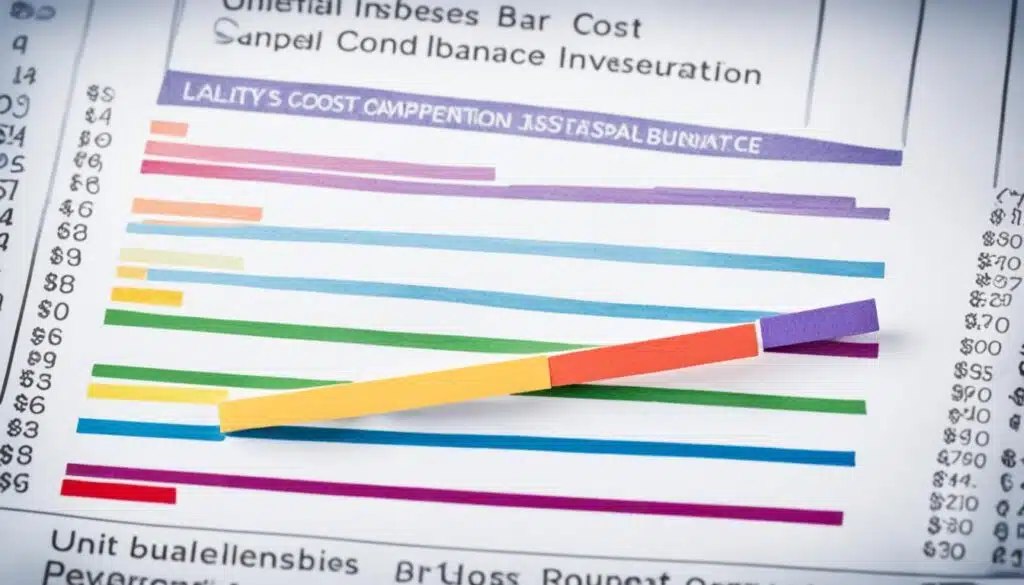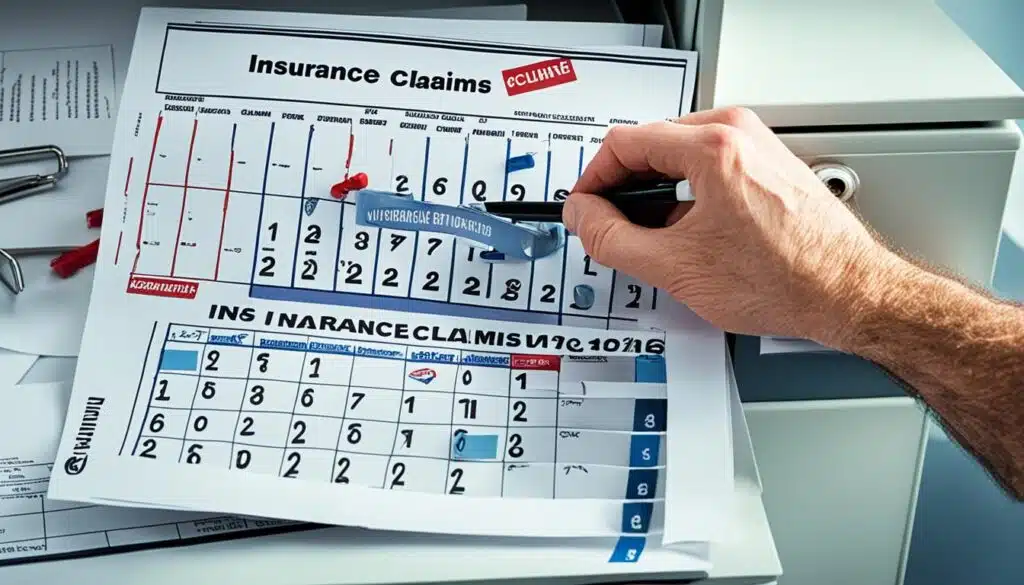Starting a small business is tough yet thrilling. You need a plan to ensure a good beginning. Choosing the right small business insurance is a vital step. It protects your investment, handles money risks, and keeps you safe from legal troubles. Let’s go through the important types of small business insurance coverage, how to find what you need, and how to keep it up. You’ll finish with a solid grasp of what your business needs to be safe.
Key Takeaways
- Protecting your investment in your small business is crucial with the right insurance coverage.
- Small business insurance helps mitigate financial risks from unexpected events like property damage or liability claims.
- Avoiding legal liabilities is essential, and the right insurance policy can cover legal costs and settlements.
- Understanding the different types of small business insurance, such as general liability and property insurance, is key to building a comprehensive coverage plan.
- Assessing your unique business needs, industry requirements, and potential risks is necessary to get the right small business insurance coverage.
Understanding the Importance of Small Business Insurance
Protecting your small business is vital, and small business insurance helps with that. It guards against financial risks from unexpected events like damage, claims, or injuries. Without it, a single issue could greatly harm your business and even put your personal assets at risk.
Protecting Your Investment
Small business insurance safeguards the money you’ve put into your business. It covers losses, letting your business tackle challenges and keep going through tough times.
Mitigating Financial Risks
In the small business world, risks like damage, claims, and injuries can hit you hard. Small business insurance eases these threats by handling the costs, saving your business from big financial hits.
Avoiding Legal Liabilities
If someone sues your business, the right insurance can pay for the legal costs. This includes settlements, protecting your business from going under. It’s key for keeping your business successful over the long haul.
Learning about small business insurance means you can act to keep your business secure. This ensures its future stability and success.
Types of Small Business Insurance Coverage

Protecting your small business is crucial. There are many key insurance coverages to think about.
General liability insurance is vital. It protects your company from injury or damage claims. Such general liability insurance helps deal with lawsuit risks.
Property insurance is also key. It covers your business’s physical assets from damage or theft. Commercial property insurance supports your business after property incidents.
Workers’ Compensation Insurance
Keeping your employees safe is very important. Workers’ compensation insurance helps if they’re hurt at work. It eases the costs of their medical care and lost wages. Also, laws in many states require businesses to have it.
Professional Liability Insurance
For service-based businesses, professional liability insurance is a must. It shields you from claims of professional errors. This professional liability insurance helps pay for legal expenses, protecting your company’s finances.
Your business may need more than just base coverage. Depending on what you do, consider commercial auto insurance, data breach insurance, or cyber liability insurance. Knowing your options lets you create a plan that suits your business’s unique risks.
Small Business Insurance

Small business insurance is crucial for protecting your future. It’s a safety net that guards against risks like property damage, liability claims, and employee injuries. These risks could put your business in danger, but the right insurance helps keep you safe.
When you run a small business, your insurance needs depend on the type of work you do. It also depends on your industry and how big your company is. Working with an insurance provider who knows your needs is key. They can make sure you have the right insurance coverage, protecting your investment.
Insurance might not be the most fun part of owning a business. Yet, it’s vital for avoiding big financial hits. Insurance does more than just protect your investment. It also helps mitigate risks so your business can grow and last for a long time.
For small businesses, insurance is a must-have. It pays for sudden expenses like damage to property, injury claims, or employee accidents. Without it, a big accident could ruin your business and maybe even your personal finances. Thankfully, insurance can take care of many different problems, making sure your business survives tough times.
Small business insurance is key to securing your company’s future. Getting the right insurance coverage can help protect your business. It ensures that you can keep your business running and growing for a long time.
Assessing Your Business Insurance Needs

In the world of small business insurance, one size doesn’t fit all. Your coverage needs change based on different aspects. These include what your business does, how big it is, and the challenges you might deal with.
Industry-Specific Requirements
Different industries call for specific insurance types. For instance, professional liability coverage is crucial for those offering services. And if your business has workers, you need workers’ compensation. Meeting these industry-specific needs keeps your business safe and legal.
Business Size and Operations
The size and how your business runs are crucial too. Bigger companies with more assets and employees often need broader coverage. Meanwhile, a small home-based business might need less. It’s important to review how your business workings affect your risks to make a solid insurance strategy.
Identifying Potential Risks
It’s key to spot the risks and liabilities that your business might face. This could be anything from property damage to employee injuries. By doing this, you can customize your insurance plan. This ensures you’re protected and following all the necessary rules.
Choosing the Right Insurance Provider
Selecting the insurance provider for your small business is crucial. It’s key to look at their reputation for good service and help they’ve given to other businesses. Also, check their financial strength. This shows if they can help when you need it most.
Reputation and Financial Strength
Search for an insurance provider known for making clients happy and keeping promises. It’s also wise to see if they are stable financially, so they can support you for long.
Customizable Coverage Options
Finding an insurance provider with many customizable coverage options is just as vital. It lets you create a policy that meets your needs. Look for someone who wants to know your business well and then offers suitable protection.
Choosing a respected and customer-focused insurance provider brings peace of mind. You’ll know your business is secure, and at claim time, you’ll get the help you need.
Cost Considerations for Small Business Insurance

Figuring out the cost of small business insurance is essential. You must find the perfect balance between insurance coverage and your budget. Many things can sway the insurance premiums you pay. These include your business’s size and industry, your claims track record, and the coverage kinds you choose. It’s crucial to talk with your insurance provider to see how these factors can change what you pay.
Factors Affecting Premiums
A few main things influence the cost of small business insurance. Your business’s size and what industry it’s in matter. So does the history of your claims. The coverage choices you make and the deductibles & limits you set also play a big part in the insurance costs.
Balancing Coverage and Costs
Yes, the price of insurance is key, but don’t skimp on coverage to save. Not having enough insurance could lead to major money troubles. This could be worse than the money you save now. Assess your insurance needs with your insurance provider. Finding the right mix of protection and cost ensures you’re well-covered without overspending.
Obtaining and Maintaining Insurance Coverage
To get the right small business insurance, many steps are needed. First, you’ll fill out an application process with your insurance provider. You’ll tell them about your business, what you do, and any risks. This helps the insurer understand your needs and offer a good price. After getting your insurance policies, it’s key to always review and update policies them. This makes sure they still fit what your business does. You might need to change your coverage limits or add new protections. Getting a certificate of insurance is important too. It shows others you’re covered. Keeping your small business insurance up-to-date is vital for staying prepared as your business and the risks around you change.
Being in touch with your insurance provider is crucial. It means your business is well-guarded now and later. Insurance can really protect your hard work. It lets you focus on making your business better.
Claims and Risk Management Strategies

Even with the right small business insurance coverage, surprises can still happen. They might make you file an insurance claim. It’s very important to know the claims process. Work closely with your insurance company to solve things quickly and smoothly.
Filing Insurance Claims
Filing for insurance claims means you’ll need all the data ready. You must submit the proper forms and keep checking to ensure your claim is handled quickly. Acting fast and being open with your insurance provider is key. This way, you protect your business and reduce the hit from surprises.
Implementing Risk Mitigation Measures
Handling insurance claims is one part. But it’s critical to stop incidents before they cause trouble. You can set up safety rules, follow top cybersecurity tips, keep everything in good shape, and use other plans. These all should match what your business does and the area it’s in.
Dealing with claims management and risk management together is very smart. It helps keep your small business safe and cuts the effect of surprises on your earnings. Insurance protects your business. Yet, making plans to lower risks is just as crucial for your business’s future health and steadiness.
Also Read : What To Expect During The Insurance Claim Process?
Conclusion
Small business insurance is a must for securing your company’s future. It’s all about knowing what coverage types you need. And making sure you choose a trusted insurance provider.
This process might feel overwhelming. But, it’s key for protecting your business from legal and financial troubles. The safety and peace it brings are worth it.
Starting or already running a business? Put small business insurance at the top of your to-do list. It’s essential for making your company tough and ready for what comes.
Insurance is there to keep your investment safe. It helps your business not just survive but thrive over time. Remember, for any business, having insurance is crucial. It protects the effort you’ve put in and the future of your enterprise.
FAQs
Q: What factors affect the cost of small business insurance?
A: The cost of small business insurance can be influenced by various factors such as the type of business, its size, location, coverage needs, and claims history.
Q: How can I get a business insurance quote?
A: You can get a business insurance quote by contacting insurance companies directly, working with insurance agents, or using online platforms that provide quotes.
Q: What types of business insurance products are available?
A: There are various types of business insurance products available, including general liability, business property insurance, business interruption insurance, errors and omissions insurance, and commercial insurance.
Q: Why is business insurance important for small business owners?
A: Business insurance is important for small business owners as it protects their business assets, provides liability coverage, and helps in minimizing financial risks associated with unforeseen events.
Q: What does a business owner’s policy typically cover?
A: A business owner’s policy typically covers general liability insurance, business property insurance, and business interruption insurance tailored for small business needs.
Q: How can insurance for small business protect my business?
A: Insurance for small business can help protect your business from financial losses due to property damage, lawsuits, business interruptions, or other unforeseen events that may disrupt your business operations.
Q: Why should small businesses invest in general liability insurance coverage?
A: Small businesses should invest in general liability insurance coverage to protect themselves from potential third-party claims related to bodily injury, property damage, advertising mistakes, and other liabilities.





